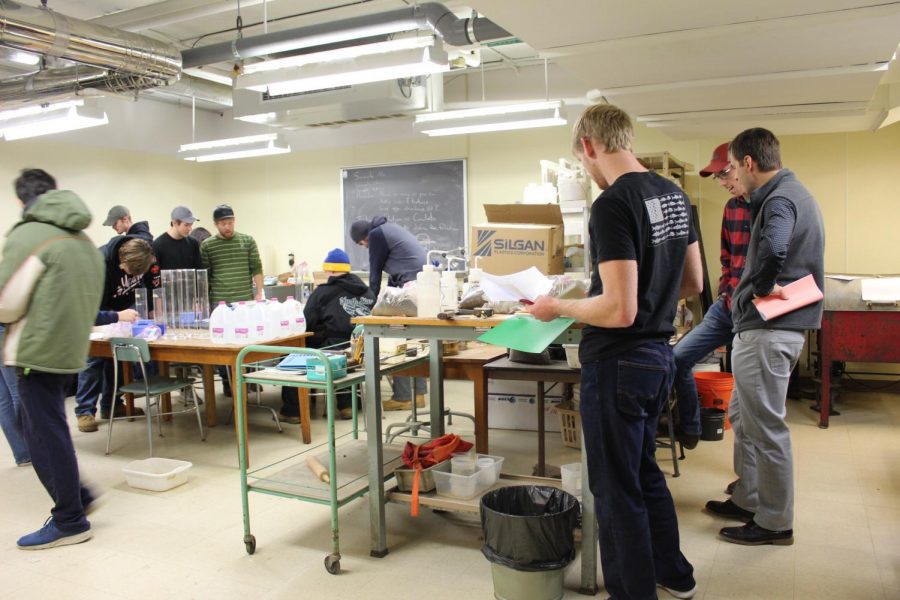Geology program is top 10
Energy and Earth Resources Department Coordinator Chris Coughenour (right) observes his Geology of Soils class Friday as his students work on projects from soil samples they collected.
November 13, 2019
Pitt-Johnstown, Pitt-Oakland and Pitt-Bradford have been named in the top 10 list of best colleges for geology majors, according to Zippia Public Relations staff member Kristy Crane.
Energy and Earth Resources Department Coordinator Chris Coughenour said there are a number of reasons Pitt-Johnstown is on the list.
He said Pennsylvania has a legacy of environmental issues and many places in the state employ geologists.
He also said there are usually around 10 to 12 students who graduate with geology degrees every year.
“It’s good for our students because they get more personal attention from faculty,” he said. “(Pitt-Johnstown) in general has smaller class sizes, which is why some students choose to come here.”
Coughenour said another reason Pitt-Johnstown has a good geology program is because geology professors emphasize practical applications of geology.
“We try to train students for the transition into an actual job,” he said. “We try to keep a practical focus. The program is also rigorous; I don’t think anyone would say this is an easy major.”
He said what impresses him about Pitt-Johnstown’s geology program is how students balance their school work and personal lives.
“A lot of students work outside of school, and I don’t know how they do it. That’s one thing that impresses me; their work ethic.
“We’ve seen good placement of students when they graduate. Nearly all of them have a job within a pretty short amount of time, usually within a few months,” he said.
“We offer a full major and students can choose between two concentrations in that major,” he said.
He said if students want to be able to sign off on geology reports in the field after graduating, they are required to have a professional geologist license.
This license can be obtained by taking and passing the courses Structural Geology and Geologic Field Methods.
After graduating and having five years of experience working in the geology field, students then must apply to take the Fundamentals of Geology exam, which is offered twice a year at a testing site, usually in Harrisburg.
“Our students work pretty hard, and sometimes they’ll think they aren’t doing well when they really are,” Coughenour said.
Energy and Earth Resources Assistant Professor Ryan Kerrigan said it is nice that Pitt-Johnstown is being recognized for preparing students to go out into the field.
“We have a lot of alumni connected through the geologic community here in Pennsylvania,” he said.
“I attend several geology conferences every year, some national and some regional, and I always see Pitt-Johnstown alumni there.
“Every year there is a conference called the Field Conference of Pennsylvania Geologists, which is mainly organized by the Pennsylvania Geological Survey, but this year our department gets to help them organize it, and that’s pretty exciting.”
Kerrigan said it is rare that a student comes to Pitt-Johnstown devoted to geology, and that students usually pick up a geology major after they begin classes.
“When I talk to my colleagues, they seem surprised by how many students we have,” Kerrigan said.
“We know we can do better, but we aren’t unsatisfied.
“We definitely are trying to get more students interested in geology.”
“We’re offering more intro level geology courses. There’s a class called Geology of National Parks being offered for the first time next semester.
“We’re proposing other courses as well, such as Geology in Cinema, where we will look at natural disasters in movies and see how accurate the science actually is.”
“We want to be able to reach a broader audience and show people what you can actually do with a geology major.”
Kerrigan said there are many different things students can do with a geology major.
“It’s more than just studying rocks,” he said. “Most jobs have a field component to it. You can go out and study river flows, contamination, there’s always something to do.
“What drew me in to geology was I was able to go out into the field and get paid to do it.
“That’s one thing we like to do here; it’s getting students out into the field. For every class I run, there’s a field trip associated with it.
“We also work with the Geology Club, and students can attend extra trips to different locations, sometimes even out of the country.
“This March, there’s a group of about 20 students going to Iceland.
“There are many geology-themed trips to expose students to different kinds of geology not just in Pennsylvania, but in other countries, as well.”
Kerrigan said he hopes the new introduction classes will get more students interested in geology classes and not just take the introduction classes to satisfy the Worlds of Knowledge requirement.
“If you want to be a scientist and study the Earth, this is the major you should have,” he said.


